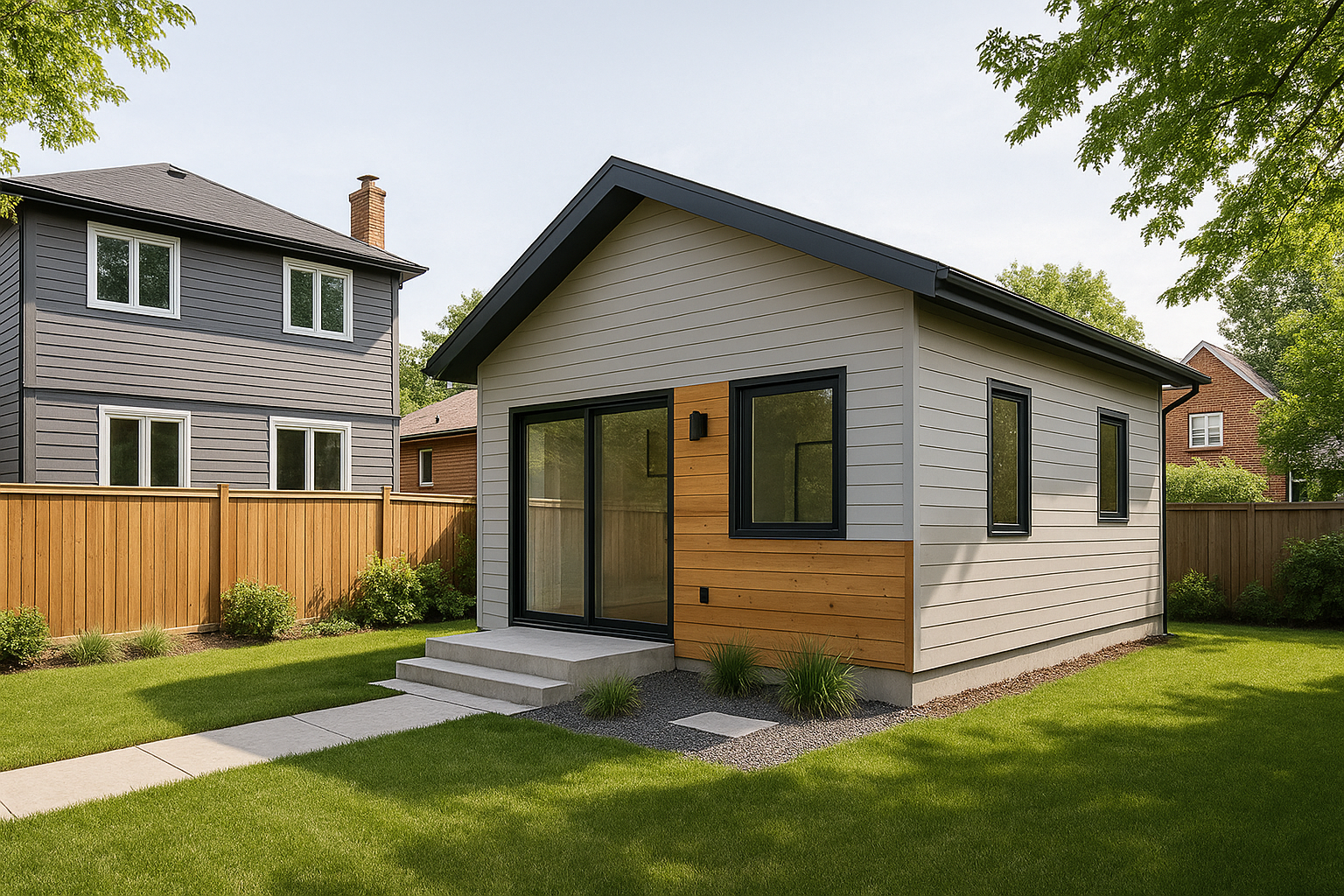
Backyard Homes Canada: How Backyard Homes Impact Property Value and Real Estate Investment
Estimated reading time: 8 minutes
Key Takeaways
- Boost in Property Value: Backyard homes can increase property value through flexible design and additional rental income opportunities.
- Smart Real Estate Investment: These accessory dwelling units (ADUs) provide unique investment opportunities by generating steady rental income and enhancing resale value.
- Urban Development & Sustainability: Backyard homes contribute to sustainable urban growth, increased density, and efficient land use.
- Diverse Living Options: Serving as guest houses, family dwellings, or home offices, they address multigenerational living and flexible workspaces. For insights on multigenerational living, check out this guide.
Table of Contents
- What Are Backyard Homes? Explaining Backyard Homes Canada
- Increase in Property Value: The Effect of Backyard Homes Canada
- Backyard Homes as a Real Estate Investment in Canada
- Impact on Canadian Housing and Urban Development
- Practical Steps for Homeowners and Investors Considering Backyard Homes Canada
- Conclusion: Why Backyard Homes Canada Matter
- Frequently Asked Questions
What Are Backyard Homes? Explaining Backyard Homes Canada
Backyard homes Canada are detached, private living units placed in the yard of an existing house. Also called accessory dwelling units (ADUs), garden suites, or laneway homes, they offer full independence for residents with features like:
- Private kitchen: Fully functional, similar to a condo.
- Bathroom and laundry: Equipped with self-contained plumbing and appliances.
- Living and sleeping area: Comfortably divided for daily living.
These dwellings serve multiple purposes including housing family members, providing a guest house, or serving as a long-term rental unit. In many cities, updated zoning regulations have made building these units easier. For example, Toronto’s garden suites policy allows homeowners to legally add these units. Read more at Toronto City Planning – Garden Suites.
Canadian regulatory background:
- Local zoning and by-law amendments have opened the market for backyard homes in major cities.
- The policy and regulatory changes, including Ontario Regulation 462/24 and the EHON project, streamline development.
For a comprehensive look, visit Toronto City Government – Garden Suites.
Increase in Property Value: The Effect of Backyard Homes Canada
Adding a backyard home in Canada can boost your property’s value significantly. In key markets like Toronto and Vancouver, a legal garden suite may increase value by 10% to 20% or more.
How backyard homes affect property value:
- The added rental income stream is a major attraction for both homeowners and investors.
- Flexibility is valued highly, offering extra space for family living, home offices, or long-term rentals.
- Homes with legal secondary units tend to be appraised higher and sell faster due to market trends.
For further reading, check out Toronto Planning: Garden Suites Impact.
Backyard Homes as a Real Estate Investment in Canada
Why Backyard Homes Make Good Investments
- Rental income: A well-built garden suite can offer monthly rents between $1,500–$2,500, depending on location and amenities.
- No land purchase needed: Utilizing existing property saves the cost of acquiring additional land.
- Stronger resale values: Enhanced property functionality attracts buyers and higher appraisals.
- Tax benefits and diversified income: Certain expenses may be claimed, and investment income maximized under provincial and federal tax rules.
Risks and Considerations
- Regulation and zoning: Policy changes can affect build permissions. Learn more at Acton ADU – Risks of Building a Backyard House.
- Upfront expenses: Construction costs can vary from $200,000 to $400,000+.
- Permitting and compliance: Navigating permits and inspections adds complexity to the project.
- Ongoing management: Renting and maintaining an additional suite demands active management.
For additional insights, explore resources from Acton ADU: Building a Backyard House and Toronto City Planning – Garden Suites.
Impact on Canadian Housing and Urban Development
Addressing Housing Shortages
- Backyard homes add valuable independent units without extensive new land development.
- They provide affordable and flexible housing options for young renters, students, aging relatives, and multi-generational families.
Urban Density Made Smarter
- These units support increased density without expanding the urban footprint.
- Improved density encourages vibrant neighbourhoods and supports local businesses while preserving community character.
Sustainable Use of Land
- Smaller physical footprints maximize underused spaces and incorporate energy-efficient designs like green roofs and solar panels.
For further discussion on sustainable urban development, see Toronto City Planning – Smart Urban Density.
Practical Steps for Homeowners and Investors Considering Backyard Homes Canada
For Homeowners: Adding a Backyard Home
- Check regulations: Review local zoning rules and set-back limits. In Toronto, many properties are eligible for garden suites. Learn more at Toronto Eligibility for Garden Suites.
- Calculate costs: Prices range from around $200,000 for a basic suite to over $400,000 for larger builds.
- Finance options: Home equity or specialized ADU construction loans are common choices.
- Professional help: Engage an architect or builder experienced with ADUs to ensure compliance and quality construction.
- Consider rental potential: Evaluate the benefits of designating the unit as a legal rental suite.
For Investors: Maximizing Real Estate Investment
- Market research: Assess local rental demand; in some cities, ADU demand significantly outpaces supply. For related insights, see ADU Investment Canada 2025.
- Appraisal and resale: Review recent property sales of homes with secondary units to gauge value gains.
- Regulatory vigilance: Stay current with local bylaws that might affect building, renting, or resale.
- Long-term costs: Budget for construction, maintenance, and potential vacancies.
- Stay informed: Regularly check updates from city planning departments. For additional context on secondary unit benefits, see Secondary Unit Benefits in Canada and explore flexible home office options at Home Office ADU & Backyard Productivity.
Conclusion: Why Backyard Homes Canada Matter for Property Value, Investment, and Urban Development
Backyard homes Canada are reshaping property value dynamics, real estate investment strategies, and urban development. They deliver measurable benefits:
- Increased Property Value: ADUs contribute directly to higher appraisal values.
- Lucrative Investment: Consistent rental income and improved resale value make them a smart investment.
- Sustainable Urban Growth: They support higher density and resource-efficient communities.
Strong regulatory support, innovative design, and practical investment strategies ensure that backyard homes are a forward-thinking solution for modern Canadian housing. For further insights, visit Backyard Homes Canada Value and review additional investment guidance at ADU Investment Canada 2025.
Frequently Asked Questions
Q1: What exactly is a backyard home?
A backyard home is an accessory dwelling unit (ADU) that is built on the same property as a main residence. It provides a separate living space that can serve as a guest house, rental unit, or home office.
Q2: How do backyard homes increase property value?
They can increase overall property value by adding rental income potential and providing flexible living arrangements that many buyers find appealing.
Q3: Are there any financing options for building a backyard home?
Yes, many homeowners use home equity loans or specialized construction loans designed for ADUs. It’s important to research local regulations and incentives before proceeding.
Q4: What are the key regulatory considerations in Canada?
Local zoning laws, permit requirements, and building codes play a significant role. Always consult with local authorities and professionals to ensure your project complies with regulations.

Leave a Reply